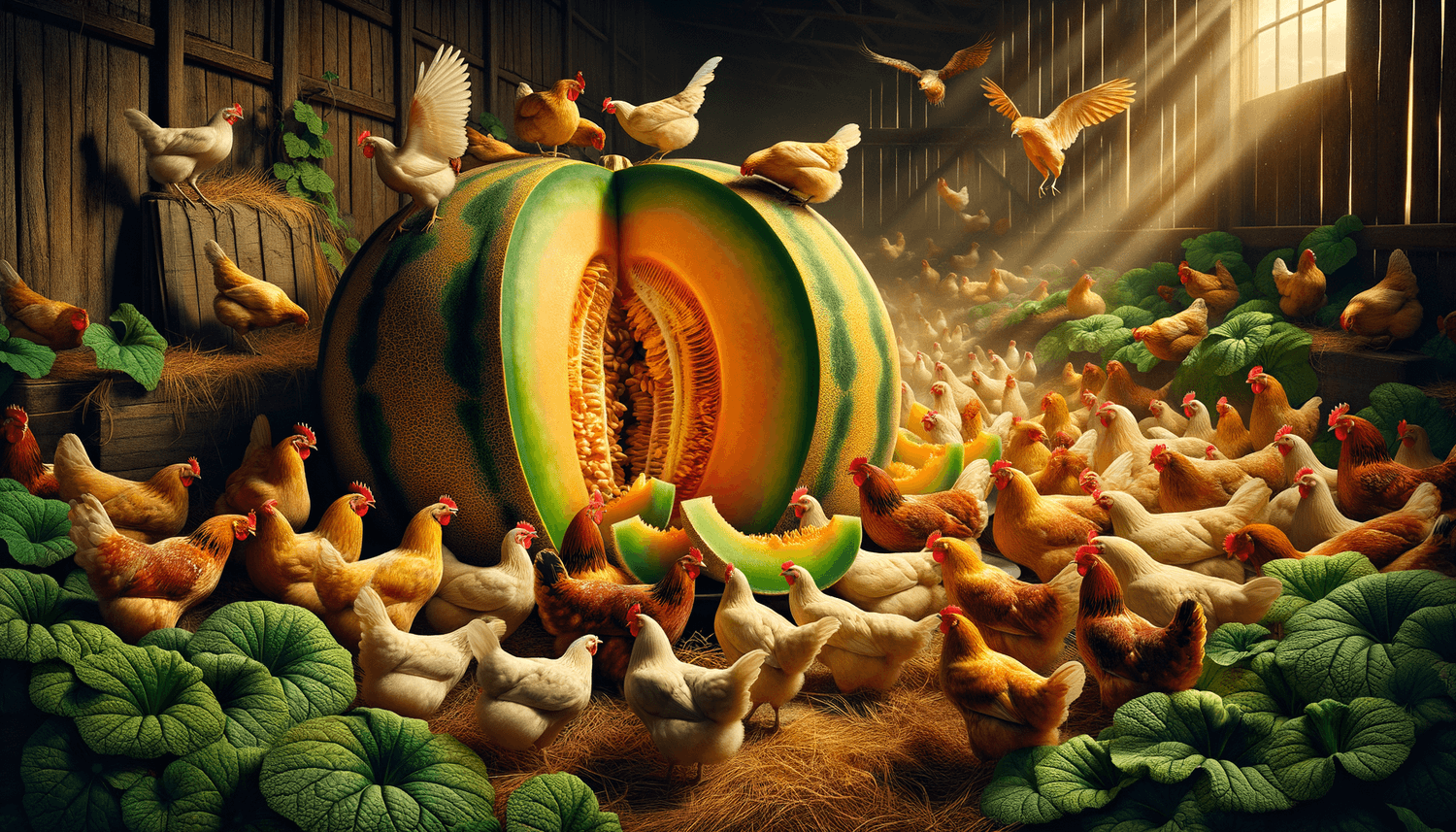Welcome to our cluck-tastic blog, where we are always excited to talk about our favorite feathery beings – backyard chickens! 🐔 Today, we’re going to have a melon-choly discussion and answer one of the most asked questions out there: Can chickens eat melon? 🍉 But don’t worry, it’s not all about the melon! We will also dive into the importance of a balanced diet, the benefits and/or risks of our fruity friend, the nutritional value, and yes, the how-to of preparing that sweet treat for your peckish peeps!
Can chickens eat melon?
Yes, chickens can eat melon, and it is safe for them! Melon is a healthy and delicious treat that offers hydration, vitamins, and minerals for your chickens. However, moderation is key, as too much melon can lead to an unbalanced diet and may cause digestive issues for your feathery friends.
A balanced diet for your backyard flock
Just like humans, chickens need a balanced diet to thrive and stay healthy. A chicken’s diet should primarily consist of a high-quality chicken feed, which should make up around 80-90% of their diet. Chicken feed is specifically designed to meet their nutritional needs and provide them with the essential nutrients they require for growth, energy, and egg production.
The remaining 10-20% of a chicken’s diet can consist of treats like fruits and vegetables, that add variety and excitement to their meals. While melons and other such delights are safe and enjoyed by chickens, these should be limited to small portions and offered in moderation. Remember, fruits and vegetables are supplementary to their standard chicken feed and should not replace it. By offering a well-rounded diet, you will ensure that your flock stays happy, healthy, and productive!
Nutritional value of melon for chickens.
Feeding melon to chickens can offer several nutritional benefits, making it an enticing and valuable treat for your feathered friends. Rich in vitamins A and C, melon can help boost your chickens’ immune systems and support their overall health. Vitamin A is vital for maintaining good vision, skin, and feather health, while vitamin C works as an antioxidant to protect cells and promote healing.
Moreover, melon is an excellent source of hydration for chickens due to its high water content. This makes it a great summer snack for your flock, as it helps them to stay refreshed and cool during hot days. Additionally, melon contains trace amounts of various minerals, such as potassium and magnesium. These minerals contribute to the proper functioning of various bodily systems in your chickens, including the nervous system, muscle growth, and bone development.
While melon doesn’t offer a significant amount of protein or other essential nutrients that chicken feed does, it still complements the well-rounded diet of your flock by providing its own unique benefits. Ensuring that melon is offered in moderation alongside a high-quality chicken feed will allow your chickens to enjoy this tasty treat while reaping its nutritional advantages.
Nutrition table of melon for chickens.
| Information | Description |
|---|---|
| Nutritional Value | Rich in vitamins A and C, potassium, and magnesium. |
| Suggested Serving Size | Small portions, limited within the 10-20% of diet for treats. |
| Safe Feeding Practices | Feed in moderation, along with a high-quality chicken feed. |
| Preparation | Clean and chop melon into small pieces; remove rinds and seeds. |
| Potential Risks | Overfeeding may lead to an unbalanced diet and digestive issues. |
| Hydration | High water content provides excellent source of hydration. |
| Digestion | Easy to digest if given in appropriate quantities. |
| Seasonal Availability | Peak availability during the summer months. |
| Other Benefits | A tasty treat promoting variety and excitement in the chicken’s diet. |
Preparing melon for your chickens
When it comes to preparing melon for your chickens, the process is relatively simple. First, make sure to wash the melon thoroughly to remove any possible contaminants or residues from the surface. Next, cut the melon into small, bite-sized pieces that your chickens can easily peck and consume. Remember to remove any seeds and rinds, as they can be difficult for your chickens to digest and may pose a choking hazard.
Serving suggestions
You can offer the prepared melon pieces to your chickens in a variety of ways. One popular method is to scatter them around the coop or run, allowing the birds to forage and hunt the treats on the ground. This approach not only adds variety to their diet, but also encourages natural and engaging behaviors, such as scratching and pecking.
Alternatively, you can serve the melon pieces in a shallow bowl, plate, or even directly in their food dish along with their regular feed. Make sure to observe your chickens while they enjoy this treat to ensure that they are consuming it without any difficulties. If you notice any uneaten melon after a couple of hours, it’s a good idea to remove it to maintain the coop’s cleanliness and prevent the potential growth of mold or other pathogens.
Other treats for your chickens
While melons are a great option, there are plenty of other fruits and vegetables you can offer to your backyard flock as a part of the 10-20% treat allowance. Some popular choices include leafy greens, such as kale or spinach, berries like strawberries and blueberries, and other fruits such as apples, pears, and grapes. Introducing your chickens to a variety of healthy treats not only encourages their natural foraging behaviors but also contributes to their overall well-being and satisfaction.
Remember to always research any new food items before offering them to your chickens, as some foods can be toxic or harmful to their health. With a thoughtful approach to treats and a focus on a balanced diet, you’ll be well on your way to raising a healthy, happy flock!

















